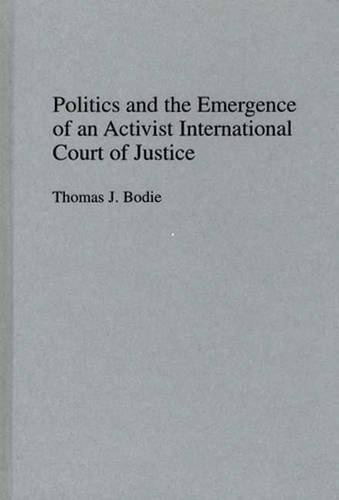
Politics and the Emergence of an Activist International Court of Justice
(Hardback)
Publishing Details
Politics and the Emergence of an Activist International Court of Justice
By (Author) Thomas J Bodie
Bloomsbury Publishing PLC
Praeger Publishers Inc
14th February 1995
United States
Classifications
Tertiary Education
Non Fiction
International relations
341.552
Physical Properties
Hardback
128
Description
The extent to which law circumscribes the activities of states is an old dilemma in international law. The traditional position of the states has been that some areas of international relations are not susceptible to legal resolution. This arises from a desire to protect as much sovereignty as possible. Opposed to this is the position which suggests that there are no issues to which international law does not speak. At stake is the usefulness of international adjudication. This book addresses this political/legal dichotomy through doctrinal study and case law. The considerations of previous scholars, as well as state practice and the opinions of various international courts are all included. The author finds that although scholarly opinion and state practice incline toward a more realist position that recognizes the imperatives of state sovereignty, the International Court of Justice has never turned away a case due to the political sensitivities of the subject matter or of the disputants. The Court has quietly set a jurisprudence for the international community that is more idealistic than realistic.
Reviews
.,."furnishes considerable insight into the increasingly salient role of adjudication in international affairs. For doing so, it merits high commendation. Bodie's short but thoughtful study succeeds in clarifying the need for international political stability and legal order, and, in particular, the World Court's contribution to these ambitions. Scholars, students, and practitioners of international law and organization will, therefore, welcome this volume with particular interest. International regime theorists will also find it intellectually stimulating."-Mershon International Studies Review
.,."presents a refreshing perspective for both the novice and the experienced reader of the adjudicatory facet of international dispute resolution."-American Society of International Law
...furnishes considerable insight into the increasingly salient role of adjudication in international affairs. For doing so, it merits high commendation. Bodie's short but thoughtful study succeeds in clarifying the need for international political stability and legal order, and, in particular, the World Court's contribution to these ambitions. Scholars, students, and practitioners of international law and organization will, therefore, welcome this volume with particular interest. International regime theorists will also find it intellectually stimulating.-Mershon International Studies Review
...presents a refreshing perspective for both the novice and the experienced reader of the adjudicatory facet of international dispute resolution.-American Society of International Law
..."presents a refreshing perspective for both the novice and the experienced reader of the adjudicatory facet of international dispute resolution."-American Society of International Law
..."furnishes considerable insight into the increasingly salient role of adjudication in international affairs. For doing so, it merits high commendation. Bodie's short but thoughtful study succeeds in clarifying the need for international political stability and legal order, and, in particular, the World Court's contribution to these ambitions. Scholars, students, and practitioners of international law and organization will, therefore, welcome this volume with particular interest. International regime theorists will also find it intellectually stimulating."-Mershon International Studies Review
Author Bio
THOMAS J. BODIE is an international relations specialist and writer residing in Pennsylvania. He received his Ph.D. in government and politics at the University of Maryland, College Park.
